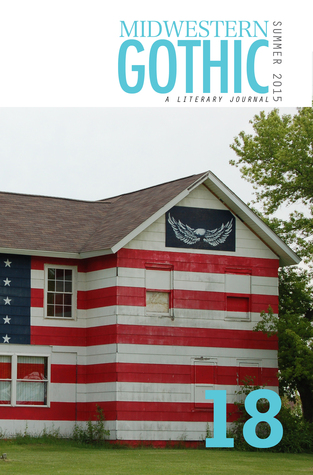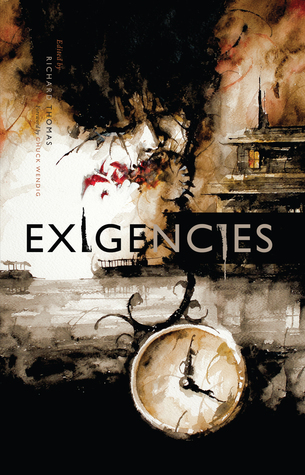
Another summer, another issue of Midwestern Gothic! It’s amazing that no matter how long we do this, there’s always wrenches and new wrinkles that get thrown into the process. This issue will always stand out to me (I hope, if it happens again I’ll probably get committed to an asylum) as the one we lost. In the midst of copyediting, my hard drive fried and my multiple layers of redundancy backups failed, sending most of the work spent laying out the galley and making copyediting changes into the ether. I gave myself a half hour to feel bad for myself and ate some fast food that made me feel even worse, and then got right back at it.
The positive that came out of that experience was that I was able to get reacquainted with the stories and poems inside. There’s something about laying out a galley and designing how the words appear on the page that’s very tactile, almost like you can feel the work taking shape. And it reinforced why I enjoyed one of my favorite pieces in the issue, “Gen-Mods,” by Brian Pals. When I tell people about Midwestern Gothic, one of my usual lines is that we’re more than corn and cows. Well, this story is all about corn. Specifically, a group of men rogueing corn for Monsanto. That’s probably why I liked it so much, that it took the stereotypes about the Midwest and corn and showed how tradition has evolved into modern reality.
Even though big farming has evolved into numbers and chemicals, there are still men walking the fields, tending to the crops in very different ways than years ago. And the dynamics of this manual labor, overseer and worker, take on a different tone. It’s a nuanced piece takes place in the midst of a prominent debate (GMOs, Bee Extinction, etc.) without an agenda. In other words, it reflects life in the Midwest, good, bad, and ugly. Which is exactly what we’re looking for. Here’s an excerpt:
It’s possible, walking corn, to sweat yourself dirty and all the way back around to clean again. Everything flushes out, and by the end of a hundred-degree day in the field, that wet wash sliding out of your hatband doesn’t even have the taste of salt to it anymore. Pure water.
You could maybe go a day without showering, but what Honzo never seemed to get was you had to change clothes. One season he wore the same T-shirt¬, 1998 Stanley Cup, Detroit Red Wings, for a solid week of work. I doubt he really smelled much worse after than he did before, though. Honzo was just naturally ripe. Maybe he had more in his system to sweat out than the rest of us.
Whatever Honzo’s aroma was, his phone call meant money. Not easy money, or even especially big money for what you had to do to get it, but roguing cornfields for a couple, three weeks of a summer could help pay down a lot of debt. For me, it was legal fees.
Honzo would contract acres from one of the seed companies—Pioneer, Monsanto,
AgriGold—and call the crew together. Me and Dennis, maybe another guy or two. We’d walk the fields, miles back and forth, with spades sharpened up to chop rogues or volunteers, types of corn that deviated. It’s primitive work of the hand and foot, a job that usually gets started around mid-July, the hottest slice of summer. The last time I worked with Honzo, though, it got hot in May, even hotter over a rainless June, and the call came a good two weeks early.
“Ready to rogue corn, Shcotty?” Missing teeth up front, Honzo had to kind of side-lisp any word with a hissing sound in it. He had a growl in his voice, too, like a dopey cartoon dog who cursed a lot. “Monsanto’s got acres, and they need that shit walked like now. $16 corn, some of it.”
The pay was by the acre, scaled to how hard the work was. A $16-per-acre field meant tough walking and a big-enough check, if you could work long hours with a small crew.
Buy a copy of Midwestern Gothic: Summer 2015 – Issue 18 for the rest of the story, and many others inspired by the Midwest.
for the rest of the story, and many others inspired by the Midwest.


